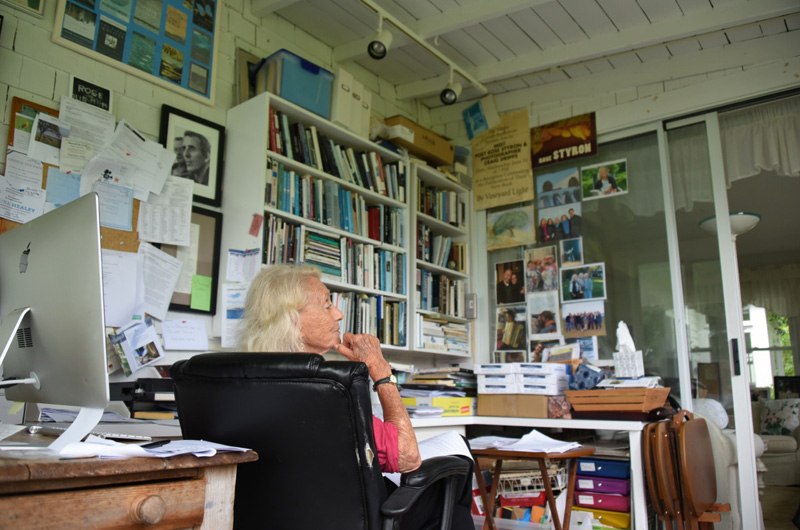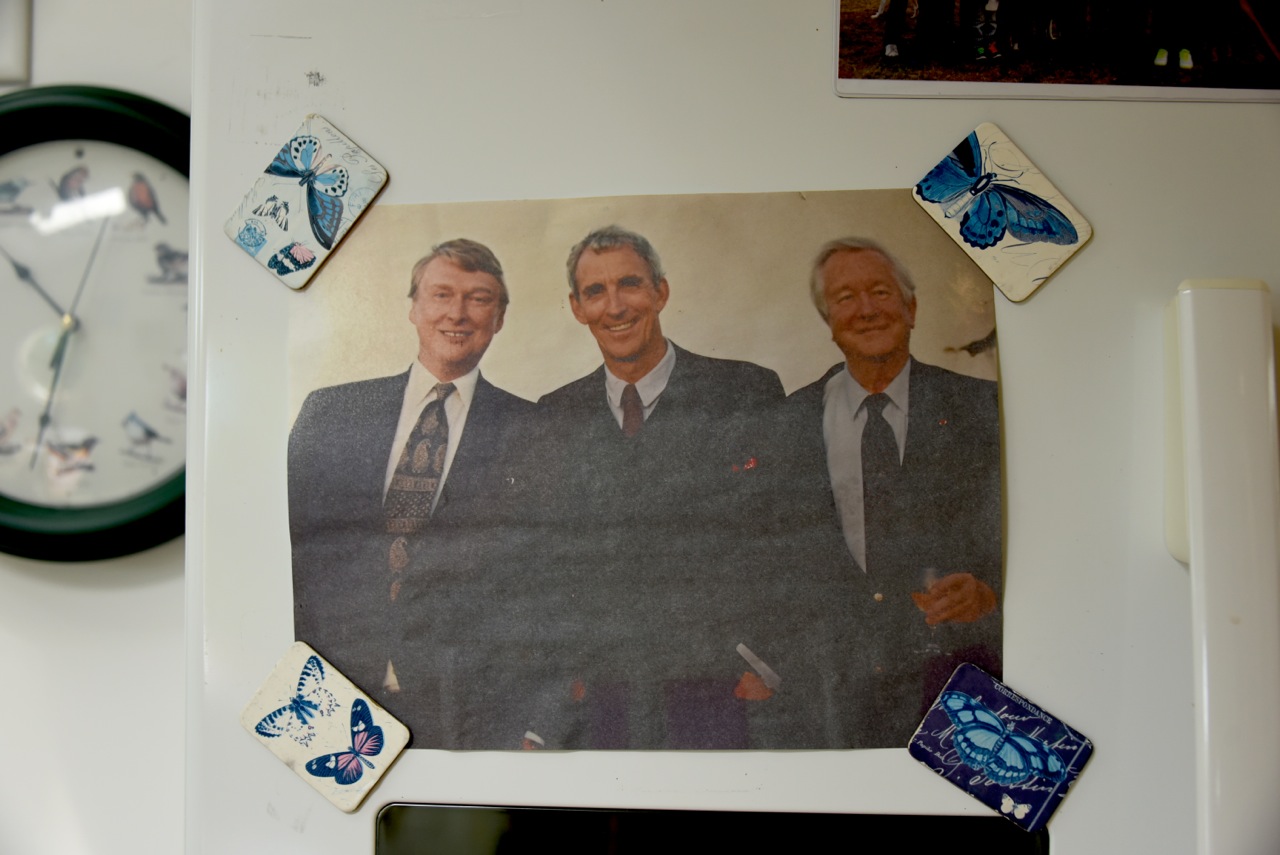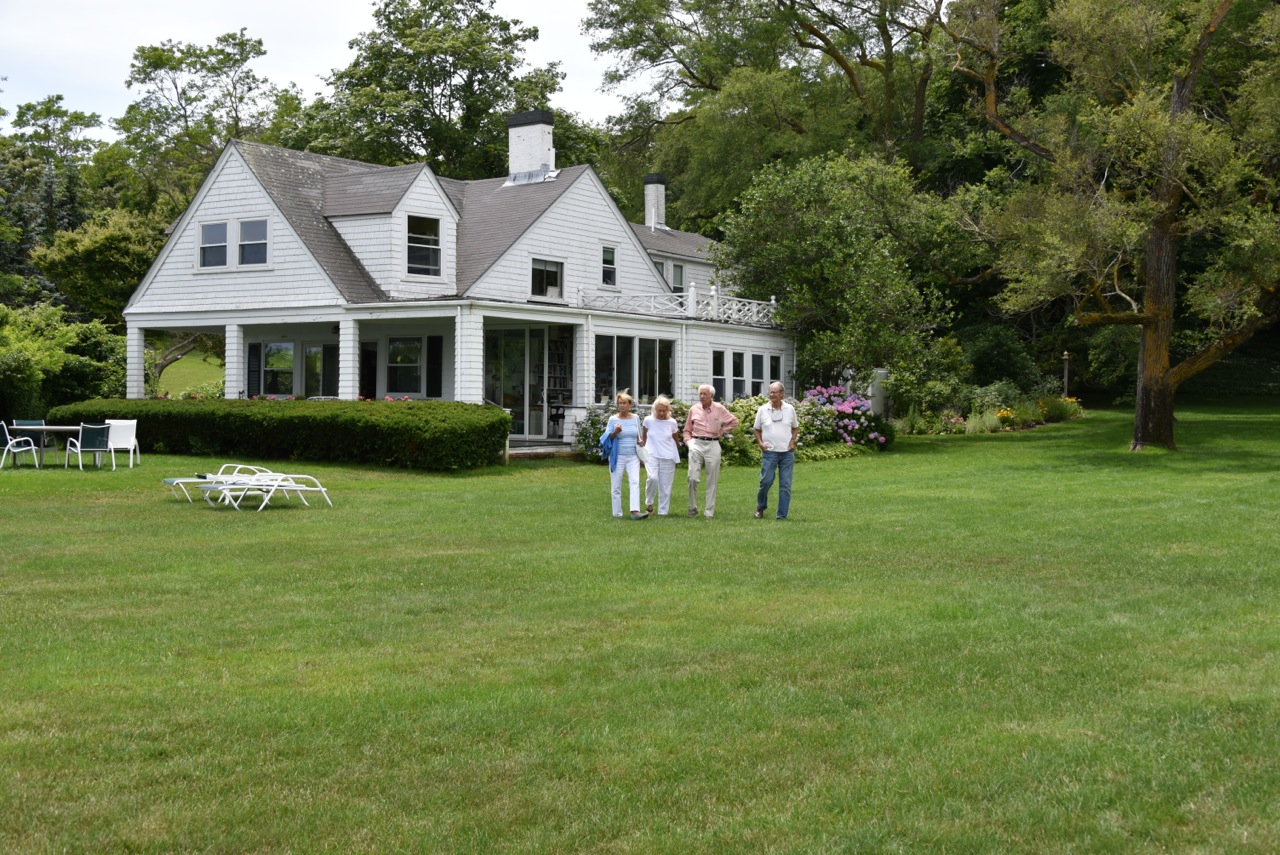Poet, journalist and human rights activist Rose Styron’s day begins with bacon. Sitting in her light-filled kitchen overlooking the Vineyard Haven harbor, she bites down on a piece.
“I know it’s bad for you and all that, but I just love it,” she says. Behind her is a wall of phone numbers — from Island taxis and the fish market to the private lines of Martha’s Vineyard’s most celebrated summer residents.
“I lost my vision for a while a few years ago and adopted this system. Someone told me I shouldn’t have these names and numbers up on a wall for all to see, but . . . ” She waves an arm in the air and laughs. “I’m not worried about it. It works.”
Her 14-year-old grandson Huck wanders into the kitchen, says good morning, grabs some bacon and then wanders out to find his mom in what Rose refers to as “the kids’ house.” Rose points to a small building near the main house. “That was Bill’s studio.”
Rose was married to the Pulitzer Prize-winning writer Bill Styron for 53 years. In 2006, he died of pneumonia at the age of 81. She tells a bit about the history of the studio: “It was one of the two prefab structures that existed when we bought the property in 1965. Bill used to sleep until noon and then we’d have lunch and then he’d go to that studio. We’d see him again at dinner and then, once the kids were in bed, I’d stay up and listen to what he’d written. The next day I’d type it up for him. Now his studio is where three teenagers are living.”
As if on cue, another young man tumbles out of the building.
“That’s Tommy Jr. He’s a sailor. All skin and bones right now.”
Tommy Jr. waves to Rose and trots across the lawn to the Vineyard Haven Yacht Club where he is working as a sailing instructor this summer. Then Huck’s mom Alexandra, whom everyone calls Al, wanders in. She greets her mom, grabs two slices of bacon and heads off to play tennis. Once Al leaves, Rose gets up and strolls into her office, which is essentially a glassed-in porch.
“I like to write outside,” she says. “This makes writing in the winter possible.”
Her office, like the rest of her home, has stacks of books everywhere, along with her tennis sneakers and racket. “I just stopped playing last year,” she says. “I liked mixed doubles so the men can run for me.”
On her office walls are pictures of Rose with Bill, Rose with her family, and Rose with her many friends.
“After John’s Hopkins [where she got her master’s in philosophy and writing], I fled to Rome. I ran into Bill there two weeks later and completely left my career for a decade. I had two books that I was supposed to write, one on Wallace Stevens and the other a collection of poems, but I never fulfilled the contracts. We married in Italy, in Ravello. We went to Paris. I met all his friends at the Paris Review. I loved them. But Europe — France, Italy — it was too beautiful for Bill to write there. He was working on Blankenship. So we headed to New York with the idea of it being a place where we could establish a routine. There would be no distractions. It was a terrible voyage from Naples. We were in this horrible third class cabin. I was sick the whole time. Bill was happily writing on his top bunk.”
She continues: “Anyway, New York was too loud. We settled in Roxbury, Conn. The house was white with green shutters for the first 10 years, but then Bill wanted a yellow house like his childhood home so we had yellow. We had three children in a hurry. And then Alexandra came seven years later. My life became Bill, his writing and the children. I was raised to let the boys be first. To follow my husband. So the house was yellow. And, to be honest, I was really interested in what Bill was working on.” She pauses, shakes her head at the memory. “To listen to Nat Turner as it came out.”
But life with Bill was not always easy. As Rose continues to share the story of her marriage, she explains that the burden of everything — the house, the children, taking care of Bill — fell on her shoulders. “Like any marriage, we fought,” she says. “Later he suffered from depression. It was work. But I knew ways to have a fine time.”
Tennis was one outlet. Writing, travel and human rights were others. One of her longtime travel partners, Victor Emanuel, is due at the house today. She met him nearly 40 years ago when he was at Harvard and wanted to quit college. He and his friend Peter Matthiessen, who was fishing and writing on Long Island, devised a plan.
“It was the early seventies and they wanted to create an excuse to travel, so a bunch of us paid to go on a trip with them,” she remembers. “It was a wonderful group of friends and their children. We went to Kenya, Tanzania, Botswana. I was blown away by the African birds. Totally hooked. And while I was there, I was asked by Amnesty International in London to check in on a writer named Breyten Breytenbach in South Africa — we were going to be flying through Johannesburg. Me on a birdwatching tour was apparently the perfect cover. But when we were in line at customs in Johannesburg, they arrested a few people in front of me. So I pulled my children out of line and headed straight for Botswana. The incredible thing that happened was that when we got to Botswana, we met a few people in a refugee camp who had seen Breyten Breytenbach and knew exactly where he was. So it all worked out.”
The trip to Africa, along with another trip to Moscow with her husband Bill, sparked Rose’s longtime involvement and commitment to human rights. “I heard about the gulags, the suffering. I wanted to, had to, do something to help. So I was a founding member of Amnesty in New York and I have been involved in one way or another ever since.”
The trip to Moscow also led her to co-author with Olga Andreyev Carlisle her first adult book of poetry, Modern Russian Poetry, a book of first translations of Russian poets. For the book, she studied Russian at Yale to be able to make elegant leaps from Russian to English.
“Osip Mandelstam was my favorite,” she notes.
Since then she has written several volumes of poetry: Thieves’ Afternoon, By Island Light and Fierce Day. She also published a collection of poems for children, From Summer to Summer, in 1965 under her maiden name Rose Burgunder.
Rose still writes every day, in the winter months when her social calendar is not so full. She just turned in a piece on Gabriel Garcia Marquez for The Review and wrote a forward Joe Esposito’s upcoming book Dinner in Camelot.
“I hate the computer,” she says. “I still write long hand and my assistant Christina types it up. It is laborious work.”
And although Bill has been dead for more than 10 years, he still remains in her life. She recently edited the Selected Letters of William Styron.
Outside in the yard, the sounds of tennis, sails flapping and children splashing in the water float over the hedge from the Vineyard Haven Yacht Club. Alexandra’s dog Dixie is hanging out on the porch in front of the children’s house. Rose gives her a pat. “She stays with me when Al travels.”
Rose’s granddaughter Martha appears in her riding kit and greets her grandmother with a smile. They have a brief chat before Martha slips into a car and heads to Arrowhead Farm for the day.
“You know, we bought this house sight unseen,” Rose says as she walks back to her house. “And when Hurricane Bob stripped these trees, making them look like telephone poles, people wanted to take them down, but I said no. Look at them now. They are beautiful. I love this yard. Football games, ping pong, croquet. So much activity. It is like a little theatre here. Mallard ducks roosting on the lawn. Eider ducks tapping on the deck and my windows. Grandchildren running here and there. I hate when all the boats are gone in the winter. But then there is the excitement in the spring when the masts start to appear again.”
The phone is ringing when Rose walks back into her house. It is the poet Jorie Graham. They chat for a bit. Rose laughs and listens. “I am so lucky to have such good friends.” She points to “my boys” on the fridge — Peter Matthiessen, Mike Nichols and her husband Bill.
“When I moved to the Island four years ago I was so fortunate to have Geraldine Brooks and Tony Horowitz living across the street. We’d play Scrabble.” She pauses. “But my closest neighbors and friends were Lucy and Sheldon Hackney. They were and are the most extraordinary of friends to us.”
Rose joined the Island Community Chorus when she moved to the Vineyard full time to meet year-round people. She added some off-Island boards to her long list of volunteer activities, including the Boston Book Festival chaired by Deborah Porter and Plimoth Plantation.
“It was hard moving here,” she admits. “In the summer I am out seven nights a week. In the winter, I’m lucky if I go out once a week.”
As she finishes this thought, her guest and friend Victor Emanuel arrives bearing pecans from Texas. Rose kisses him on the cheek and then sits down to sample the nuts. She declares them delicious. She looks up and sees Jim and Denise Reston strolling over to her porch. She pops up from her chair to say hello, then looks at her watch.
“Oh, it’s after one. Time for lunch!”
Later that night she dines with 10 friends. The following day, she will attend a book signing for Victor and host a dinner for him afterwards.
She laughs. “My social life. It’s ridiculously busy.” Then she beams. “Well, I’m never bored on the Island. I just love it here.”











Comments (6)
Comments
Comment policy »